The steps of the engineer. When the question arises, "What's next?"
On a habr with enviable constancy, publications about the stages of development of programmers flash. Sometimes serious, sometimes humorous.
Reflecting them with an eye on the picture as a whole, I came to the conclusion that this is a very special case, and any good (or not good - depends on his ability to self-criticize) specialist goes up several steps.
The number of these steps and their height are determined by many parameters: place of work, attitude to this place and to the profession as a whole, from personal qualities, from the city and much more. For me personally, quality jumps became a change of place of work. And superiors are the most important factor.

Apart from seven years of non-core work: a berry picker, a loader, a postman, a seller, a freight forwarder, a storekeeper, and a teacher, my path began not so long ago. I studied as a mathematician-programmer and, as usual among students, did not realize who I would be after graduation. But I certainly did not expect to be an administrator. At that time, I still did not understand how far my programming on the delphi of hydrodynamic problems is far from reality. Already closer to the fifth course, the words linux and cisco appeared over the horizon. What they hid under themselves beckoned, but, nevertheless, it did not loom like a prospect.
By a strange coincidence, in 2008, in the 5th year, I got technical support from a local provider - for me it was a temporary part-time job, because at that moment I was sick with three-dimensional modeling and planned to become a three-dimensional designer. Therefore, the attitude to work was appropriate - I did not even know the IP address of my computer.
The technologies used were very mixed: optics, RRL, Wi-Fi, CDMA and even modem pools were. Provided Internet, IP-telephony, hosting and email.
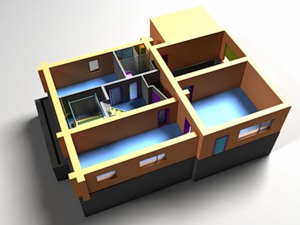
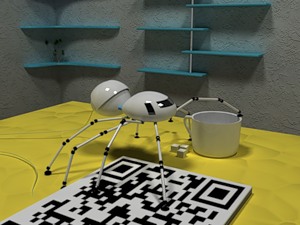
Do not hit the lying man: once in 20 minutes, view the status of hosts in Nagios, once per hour load interfaces in MRTG and answer calls from subscribers. The most difficult thing that I had to decide was to teach the user how to drive Dial-Up settings. For all other applications, you need to collect information and pass to the Admins. Then they were just Admins for me - just almighty gods, not people. I watched with admiration as these people poked around in racks and did something from their workplace on pieces of iron that were hundreds of kilometers away. Console, vlan, cisco, patchcord - all this sounded to me like spells that make network equipment come to life.
With my mouth open, I watched as Radmin visited someone on a computer in a neighboring city or a couple of teams restored radio communications on a fifty-kilometer RRL span, which for me was also something mysterious - I imagined such big clicking relays in plastic boxes. There was romance in all of this.
The most interesting thing is that for more than six months of work, I really did not even understand the meaning of the word IP address. I didn’t even get acquainted with the network diagram. But I found out who the users are, what they need and how to talk to them. In general, technical support is a great anti-stress school. In addition to this good lesson, the work carried me into the IT world - it performed its main function.
Several good people have left their mark on my telephone directory.
Then suddenly one Admin told me that someday I will also become beautiful and smart, they say, I have the potential. It’s like just words, but they sunk into my heart and I couldn’t do otherwise now.
Each person should have such authority, the word of which can determine an important decision. If a person says that he does not have authority, then most likely he is deceiving or simply not far off.
I took out books on network technologies, installed Packet Tracer, and a month later I was at the forefront of the IT industry - WiMAX. And here, like a whirlpool, there’s an endless stream of knowledge and new information. Since the time of the university, I have not had this and I realized how nice it is to study. I missed this hard work of the brain, lively discussion in the audience, questions in my head.
At this place, I tasted the delights of the work of the installer and engineer. We designed and laid SCS, pulled cables, drove out into the cold in the fields, punched communication channels and locations of base stations.
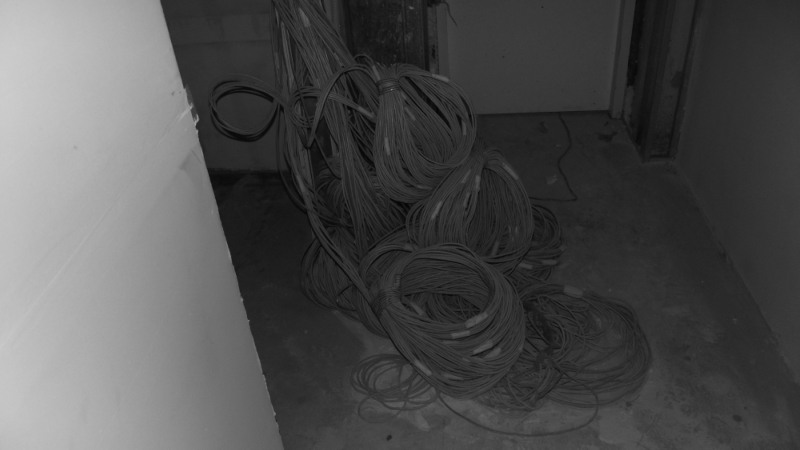
This is what I spoke about at the beginning - leadership. Two people - Dmitry Khorunzhiy and Vitaliy Aksyonov - determined my aesthetic tastes and development vector. They instilled in me the ethics of editing and documentation. “There is nothing more permanent than temporary”, “everything should be perfect”, “the best is the enemy of the good” - these are the mottos with which we lived.
I knew every cable in the face, every piece of iron in the rack, the characteristics of all devices. All interfaces were signed, on each cable (and even on power and ground) a sticker indicating where and where. Switching with us was just exemplary.
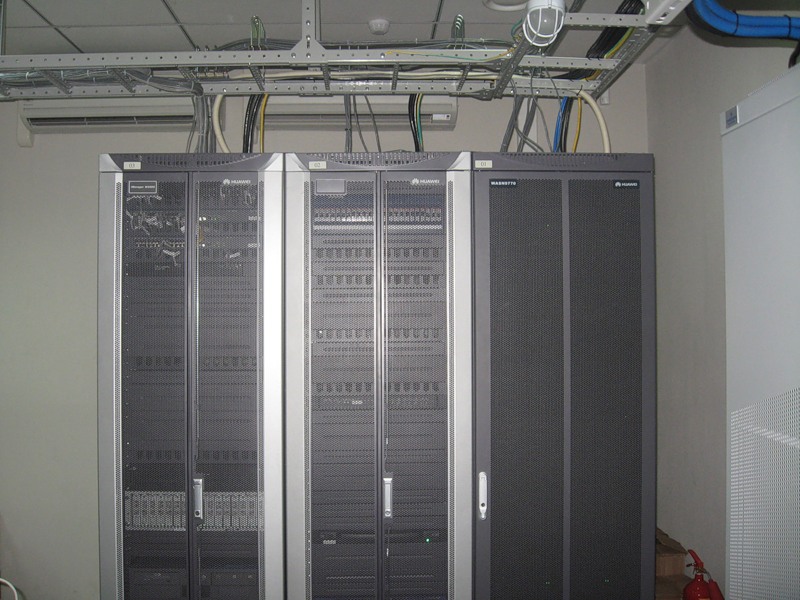
But one misfortune is tuning. I knew this question very superficially. Routers, vlans, subinterfaces - it was still so far and mysterious.
Then I came across and literally touched the first level of the OSI model, learned the installation ethics, the basics of business correspondence, and a lot of good people.
I took almost everything from this work. During this period, I started my accounts on Habr and LJ .
When everything became bad , and I decided to move on, my boss told me that it was easy to leave the telecom, but it was difficult to return.
It was pretty scary to change jobs: after training and two years in telecom, I would not want to refill cartridges.
Fortunately, I didn’t have to leave.
At the new place of work, the green circle of telecommunications tightened me. And here either the pan or disappeared: either during the trial period I am imbued with the spirit of cisco to the full or to the same extent I enjoy the search for a new job. I chose the first - I did not lose.
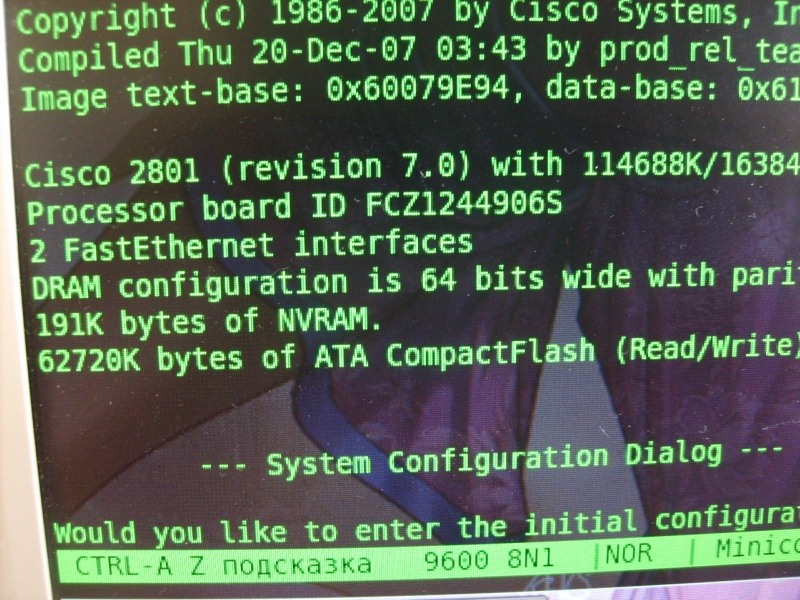
At first it seemed that I would never understand this creepy forest of routers. A little later I thought that I was one step away from nirvana - from knowing everything and everything. And then it turned out that I didn’t even see the tip of the iceberg - I stood on it and only saw grains of snow under my feet.
I met amazing people in the last two years. These are real information harvesters. They are for me now as inaccessible as those Admins. And most notably, these people are not just very strong IT specialists - they are erudite and developed in many areas. And even if, out of official necessity, I once grow to their level, then in other matters you need to make up for yourself.
At this place, I also did not disdain to go to the fields and do the installation, despite the fact that there was a whole department for this.
I often do non-core activities precisely at work. And it doesn’t matter that they don’t pay extra for this, that I could sit in the office and read bashorg, instead of going to the villages or setting up iron pieces at my request. But I know that the benefit from this will be much greater and it is not necessarily tangible. In any case, there will not be worse from another tick in the list of knowledge and skills. In addition, the world of telecom is small even on a national scale, acquaintances and reputation play an important role, and here respect is usually called not professional status, but professionalism. At least I hope so.
Here are other clients, a different scale of tasks and different network sizes. And now I am the admin who delves into the rack and connects, sitting in the office, to the equipment for hundreds of kilometers. And it’s especially nice that I control the whole process. If I set up a PBX, then I know which terminal this port goes to and where further the telephone pair runs through the building. If I connect a new communication channel, I know firsthand what is on the other hand, which cable, how crimped, where to plug it.
Ahead, as it turns out, are still immense horizons and fantastic rainbows, but now I feel the lack of a theoretical base. They say that a theory without practice is nothing. Learning, they say, is necessary in real conditions. And this is true, but the opposite is also true - practice without theory is a dead end. Only through reading did I manage to move from the first chapter of this article to the second, and from the second to the third.

Often, when a free minute is issued, I go to LiveJournal, demotivators, and several IT resources, and network documentation shyly peeks out of my backpack. Sometimes I shyly turn away, reproaching myself with laziness and weakness, and sometimes I sit down and read.
And at every stage there comes a moment when I ask myself the question: “what next?”
And now there is such a moment. The first option is to stay here and work further in anticipation of career growth. He will undoubtedly be, and I will delve into the details of my entire large network and the intricacies of customer relations. The prospects are quite decent, given the growth rate of the company in which I work. The second is to find another job. There is no urgent need for this - for my region, I have an average region, I have not exhausted my interest in current activities, it gives me pleasure to work here, but at the same time I understand the one-sidedness and limitedness of my view on building networks. The fact is that in this organization, in fact, I am the only one involved in networks. My boss solves the issues of another - mostly political - level. Therefore, I bear the burden of responsibility for the choice. My approach is what I was taught and what I learned from the scheme of an existing network. For example, there is no clear Core-Distribution-Access structure, or there is no “ring” topology, NAT is made not on one central device, but distributed across routers on the network. I would like to study this issue from different angles, and not to stiffen in the current situation.
So what's next?
Probably everyone at some point stopped at this fork and painfully made a decision?
Reflecting them with an eye on the picture as a whole, I came to the conclusion that this is a very special case, and any good (or not good - depends on his ability to self-criticize) specialist goes up several steps.
The number of these steps and their height are determined by many parameters: place of work, attitude to this place and to the profession as a whole, from personal qualities, from the city and much more. For me personally, quality jumps became a change of place of work. And superiors are the most important factor.

Inception
Apart from seven years of non-core work: a berry picker, a loader, a postman, a seller, a freight forwarder, a storekeeper, and a teacher, my path began not so long ago. I studied as a mathematician-programmer and, as usual among students, did not realize who I would be after graduation. But I certainly did not expect to be an administrator. At that time, I still did not understand how far my programming on the delphi of hydrodynamic problems is far from reality. Already closer to the fifth course, the words linux and cisco appeared over the horizon. What they hid under themselves beckoned, but, nevertheless, it did not loom like a prospect.
By a strange coincidence, in 2008, in the 5th year, I got technical support from a local provider - for me it was a temporary part-time job, because at that moment I was sick with three-dimensional modeling and planned to become a three-dimensional designer. Therefore, the attitude to work was appropriate - I did not even know the IP address of my computer.
The technologies used were very mixed: optics, RRL, Wi-Fi, CDMA and even modem pools were. Provided Internet, IP-telephony, hosting and email.


Do not hit the lying man: once in 20 minutes, view the status of hosts in Nagios, once per hour load interfaces in MRTG and answer calls from subscribers. The most difficult thing that I had to decide was to teach the user how to drive Dial-Up settings. For all other applications, you need to collect information and pass to the Admins. Then they were just Admins for me - just almighty gods, not people. I watched with admiration as these people poked around in racks and did something from their workplace on pieces of iron that were hundreds of kilometers away. Console, vlan, cisco, patchcord - all this sounded to me like spells that make network equipment come to life.
With my mouth open, I watched as Radmin visited someone on a computer in a neighboring city or a couple of teams restored radio communications on a fifty-kilometer RRL span, which for me was also something mysterious - I imagined such big clicking relays in plastic boxes. There was romance in all of this.
The most interesting thing is that for more than six months of work, I really did not even understand the meaning of the word IP address. I didn’t even get acquainted with the network diagram. But I found out who the users are, what they need and how to talk to them. In general, technical support is a great anti-stress school. In addition to this good lesson, the work carried me into the IT world - it performed its main function.
Several good people have left their mark on my telephone directory.
Then suddenly one Admin told me that someday I will also become beautiful and smart, they say, I have the potential. It’s like just words, but they sunk into my heart and I couldn’t do otherwise now.
Each person should have such authority, the word of which can determine an important decision. If a person says that he does not have authority, then most likely he is deceiving or simply not far off.
Beauty of structure
I took out books on network technologies, installed Packet Tracer, and a month later I was at the forefront of the IT industry - WiMAX. And here, like a whirlpool, there’s an endless stream of knowledge and new information. Since the time of the university, I have not had this and I realized how nice it is to study. I missed this hard work of the brain, lively discussion in the audience, questions in my head.
At this place, I tasted the delights of the work of the installer and engineer. We designed and laid SCS, pulled cables, drove out into the cold in the fields, punched communication channels and locations of base stations.

This is what I spoke about at the beginning - leadership. Two people - Dmitry Khorunzhiy and Vitaliy Aksyonov - determined my aesthetic tastes and development vector. They instilled in me the ethics of editing and documentation. “There is nothing more permanent than temporary”, “everything should be perfect”, “the best is the enemy of the good” - these are the mottos with which we lived.
I knew every cable in the face, every piece of iron in the rack, the characteristics of all devices. All interfaces were signed, on each cable (and even on power and ground) a sticker indicating where and where. Switching with us was just exemplary.

But one misfortune is tuning. I knew this question very superficially. Routers, vlans, subinterfaces - it was still so far and mysterious.
Then I came across and literally touched the first level of the OSI model, learned the installation ethics, the basics of business correspondence, and a lot of good people.
I took almost everything from this work. During this period, I started my accounts on Habr and LJ .
When everything became bad , and I decided to move on, my boss told me that it was easy to leave the telecom, but it was difficult to return.
It was pretty scary to change jobs: after training and two years in telecom, I would not want to refill cartridges.
Fortunately, I didn’t have to leave.
Out of the frying pan into the fire
At the new place of work, the green circle of telecommunications tightened me. And here either the pan or disappeared: either during the trial period I am imbued with the spirit of cisco to the full or to the same extent I enjoy the search for a new job. I chose the first - I did not lose.

At first it seemed that I would never understand this creepy forest of routers. A little later I thought that I was one step away from nirvana - from knowing everything and everything. And then it turned out that I didn’t even see the tip of the iceberg - I stood on it and only saw grains of snow under my feet.
I met amazing people in the last two years. These are real information harvesters. They are for me now as inaccessible as those Admins. And most notably, these people are not just very strong IT specialists - they are erudite and developed in many areas. And even if, out of official necessity, I once grow to their level, then in other matters you need to make up for yourself.
At this place, I also did not disdain to go to the fields and do the installation, despite the fact that there was a whole department for this.
I often do non-core activities precisely at work. And it doesn’t matter that they don’t pay extra for this, that I could sit in the office and read bashorg, instead of going to the villages or setting up iron pieces at my request. But I know that the benefit from this will be much greater and it is not necessarily tangible. In any case, there will not be worse from another tick in the list of knowledge and skills. In addition, the world of telecom is small even on a national scale, acquaintances and reputation play an important role, and here respect is usually called not professional status, but professionalism. At least I hope so.
Here are other clients, a different scale of tasks and different network sizes. And now I am the admin who delves into the rack and connects, sitting in the office, to the equipment for hundreds of kilometers. And it’s especially nice that I control the whole process. If I set up a PBX, then I know which terminal this port goes to and where further the telephone pair runs through the building. If I connect a new communication channel, I know firsthand what is on the other hand, which cable, how crimped, where to plug it.
Mosaic of choice
Ahead, as it turns out, are still immense horizons and fantastic rainbows, but now I feel the lack of a theoretical base. They say that a theory without practice is nothing. Learning, they say, is necessary in real conditions. And this is true, but the opposite is also true - practice without theory is a dead end. Only through reading did I manage to move from the first chapter of this article to the second, and from the second to the third.

Often, when a free minute is issued, I go to LiveJournal, demotivators, and several IT resources, and network documentation shyly peeks out of my backpack. Sometimes I shyly turn away, reproaching myself with laziness and weakness, and sometimes I sit down and read.
And at every stage there comes a moment when I ask myself the question: “what next?”
And now there is such a moment. The first option is to stay here and work further in anticipation of career growth. He will undoubtedly be, and I will delve into the details of my entire large network and the intricacies of customer relations. The prospects are quite decent, given the growth rate of the company in which I work. The second is to find another job. There is no urgent need for this - for my region, I have an average region, I have not exhausted my interest in current activities, it gives me pleasure to work here, but at the same time I understand the one-sidedness and limitedness of my view on building networks. The fact is that in this organization, in fact, I am the only one involved in networks. My boss solves the issues of another - mostly political - level. Therefore, I bear the burden of responsibility for the choice. My approach is what I was taught and what I learned from the scheme of an existing network. For example, there is no clear Core-Distribution-Access structure, or there is no “ring” topology, NAT is made not on one central device, but distributed across routers on the network. I would like to study this issue from different angles, and not to stiffen in the current situation.
So what's next?
Probably everyone at some point stopped at this fork and painfully made a decision?
